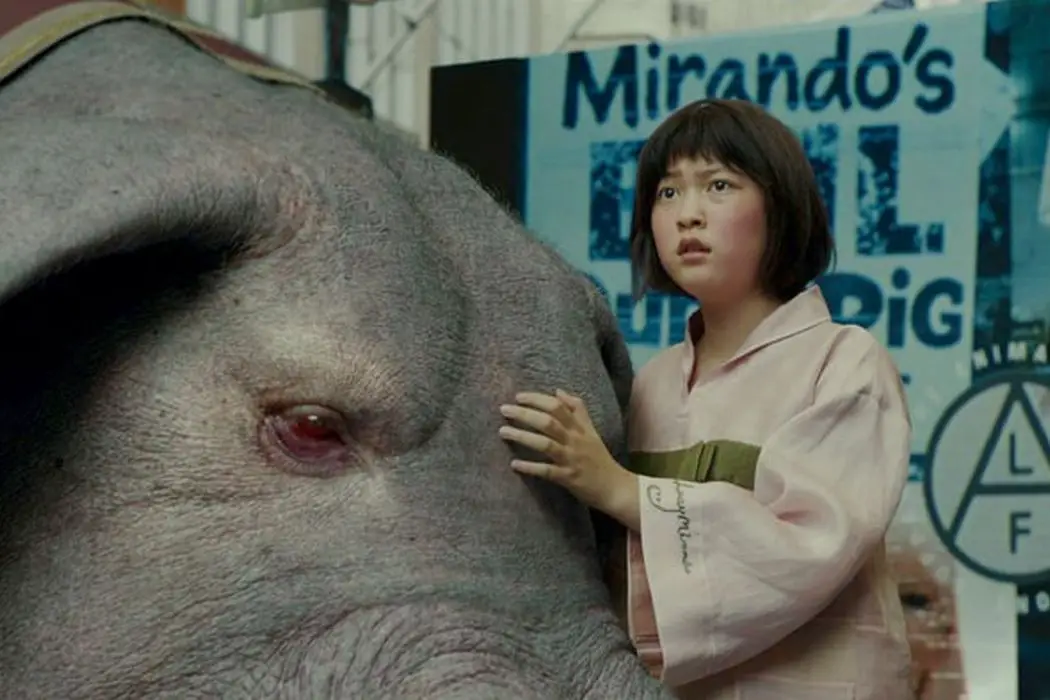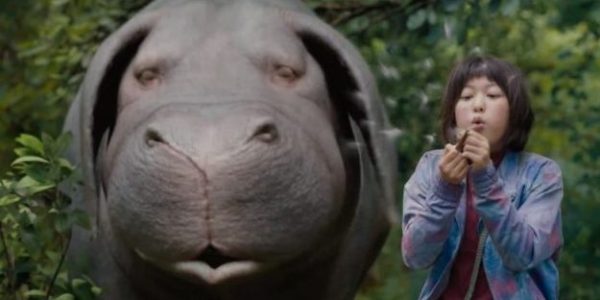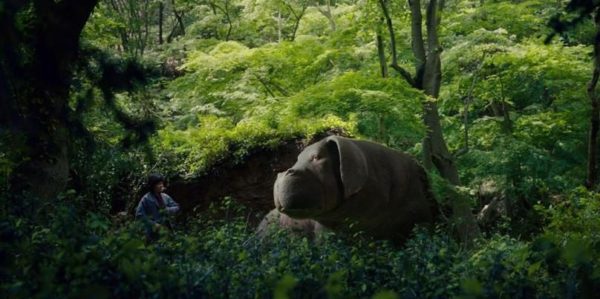OKJA: Charm & Quirkiness Allow For An Unexpectedly Powerful Message

Well, I know one thing for sure: Bong Joon-ho certainly pulls no punches when it comes to getting his point across.
We’ve come to understand heavy-handedness in movies as an inherently bad thing, but I don’t think that’s necessarily the case – at least not when it’s executed with the heart, sincerity, and quirkiness that Okja gives us.
Usually I write about what a movie does wrong and what it does right. But instead, I’d rather address what other people are saying about Okja – in particular, its most common criticisms, and why I think they’re wrong.
Tone and Coherence
A lot of detractors are saying Okja’s tone is all over the place. They’re not wrong; I just think it’s not a valid criticism. Not only are the tonal shifts intentional, but I also think that they work to the movie’s benefit. They make Okja an unpredictable, gripping thriller instead of a one-note movie with an obvious message.
After an unabashed exposition dump from Lucy (Tilda Swinton), Okja enchants us with twenty minutes of slowly getting to know our two main characters. It lets us become enamored with Mija’s (Seo-Hyun Ahn) world, and almost makes us forget where we know this movie must be headed.

These scenes are unlike any other parts of the movie, but they are absolutely essential. Without a personal connection to Mija and Okja, we’re just going to see this movie as a parable with more message than substance. We’re not going to sympathize with any characters or understand what Okja is really trying to tell us.
And then, out of nowhere, Okja immediately morphs into a kung fu-inspired heist movie with an extended, cheesy, drawn out chase scene. It’s exceptionally fun and intentionally jarring. We have just been ripped out of, essentially, utopia, and into the fast, ruthless “real world.”
The quirkiness doesn’t stop there. The constant floating between black comedy, absurdism, and heart-wrenching allegory is what’s leading some critics to condemn Okja for tonal inconsistency. Their condemnation is wrong even though their reasoning is right.
I think it’s great when movies keep us on our toes like this. Do people want to always know exactly where a movie’s going after the first twenty minutes? Do they never want to be surprised by a tonal shift or an early plot twist? Moreover, do they just want movies to drive home a single message, never taking a break to have some fun or, you know, actually be entertaining?
Ultimately, Okja is a really fun, off-the-wall movie – which is really important, for two reasons: first, it’s about giant funny-looking pigs. Taking itself too seriously would have steered us into so-bad-it’s-good territory. And second, Okja’s wackiness buys it enough goodwill to allow for some obvious (but charming), heavy-handed (but genuine) metaphors down the road.

Heavy-Handedness
The other most-often repeated criticism of Okja has to do with its unabashed symbolism and emotional manipulation. However, I think the movie is far more nuanced than it appears.
Contrary to what one might pick up at first glance, Okja is not anti-meat or pro-vegan. It’s just against the unethical way the industry operates. Remember that Mija and her grandfather eat meat at multiple meals – and Okja even goes out of its way to show their entire (humane) killing and eating process without taking a stance against it.
The movie is not just against the immorality of the meat industry; it also denounces any dishonest ways anti-meat groups may operate. In fact, a fairly important plot point is predicated on a member of ALF (Animal Liberation Front) falsely translating Korean to English, and Okja even goes so far as to poke fun at the lengths people will go to avoid eating animal products.

So, sure, the heart-wrenching finale is supposed to make you think about what kind of industry you might be supporting. Of course it’s heavy and in-your-face; Okja neither denies nor apologizes for being that way.
Instead, it thrives on being heavy and in-your-face. Its nuanced stance allows for a powerful message that doesn’t feel like propaganda – but only if you’re paying attention.
Conclusion: Okja
Okja has its issues with pacing and some especially eccentric acting choices. But these flaws are minor in comparison to its unique strengths – which, ironically, are entirely unappreciated by Okja’s detractors.
That’s enough from me – what did you think of Okja? Do you think it’s obvious and tonally inconsistent, or refreshing and nuanced? Let us know in the comments!
Okja was released on June 28, 2017 in the US and UK. For a full list of release dates, see here.
Does content like this matter to you?
Become a Member and support film journalism. Unlock access to all of Film Inquiry`s great articles. Join a community of like-minded readers who are passionate about cinema - get access to our private members Network, give back to independent filmmakers, and more.













